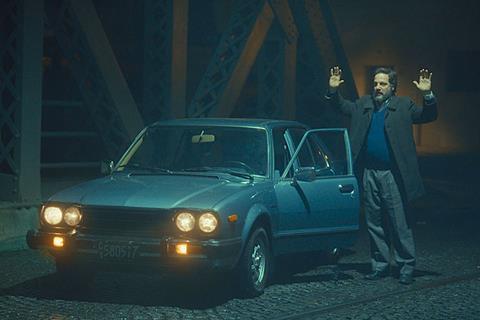The kidnap of a businessman reveals the fragility of Argentina’s new-found democracy in this 1980s-set drama

Dir: Daniela Goggi. Argentina, USA. 2023. 95mins
Buenos Aires, 1983. Julio Levy (Rodrigo de la a Serna) and his family return from exile to restart a life in Argentina following the transition from dictatorship to a democracy. The plan is for Julio to take a seat alongside his brother Miguel (Germán Palacios) in the well-heeled family business. But then Miguel is kidnapped, and Julio finds himself out of his depth, handling the ransom negotiations with no idea who, if anyone, he can trust. Adapted from the memoir ’El Salto de Papá’ by Martín Sivak, this film delves into the knotty complexities of a country in the throes of political transition and argues that a rotten core is not something that can easily be cut away. It’s a sober, densely plotted drama which suffers from its stifling, sluggish pacing and the fact that much of it plays out in anonymous grey rooms, where covert deals are cut with anonymous grey men.
Much of the weight is carried by the performances
The fourth feature from Daniela Goggi (Abzurdah, The Red Thread, television series Maria Marta) it is a film that will likely strike the most successful chord with domestic audience and those within the South American region, where this kind of story of deep-rooted corruption is all too familiar. A Paramount+ original film for Latin America, the picture’s key selling point will be the presence of the impressive De la Serna in the lead role, an actor best known for the hit Netflix series Money Heist. Following its premiere in Venice’s Orizzonti Extra section, The Rescue will screen in Toronto as a Special Presentation.
For a while at least, Julio is buoyed by hope. On the plane from Madrid to Buenos Aires, the atmosphere is festive and unguarded. Julio’s wife Silvia (Julieta Zylberberg) exchanges stories of exile with strangers in the queue for the bathroom, and an outburst of spontaneous applause greets the captain’s announcement welcoming the passengers back to Argentina. Back in the heart of the extended family, celebrations are lubricated with wine and song. But the atmosphere of jubilation is short-lived and, shortly after Julio’s first board meeting at the family business, his brother is bundled into a car with a bag on his head and a gun at his back.
Julio acts swiftly and decisively, following the kidnapper’s instructions to the letter and depositing the ransom. But his brother is not released. On day 45, Julio, together with his brother’s wife Alicia (Andrea Garrote, who also co-wrote the screenplay with Goggi), petitions the president, who is blandly sympathetic and hands over the case to his security chief. It is at this point that things start to get both complicated and expensive for Julio and his family.
Goggi navigates us through increasingly the labyrinthine corruption in a government that still shelters some of the very worst offenders from the military junta, the supposedly ousted regime. With storytelling and direction which is functional and workmanlike rather than particularly daring, much of the weight is carried by the performances, in particular de la Serna. Chain-smoking furiously, with a wet cement complexion and a posture which screams sciatica and stress, Julio is broken physically and emotionally by the drawn-out nightmare of his brother’s disappearance. And the score, which grows ever more discordant as the months pass, captures his increasingly vulnerable state of mind.
Production companies: Rei Cine, Infinity Hill, Paramount Television International Studios
International sales: Paramount Television International Studios
Producer: Benjamin Domenech, Santiago Gallelli, Matías Roveda, Axel Kuschevatzky, Cindy Teperman
Screenplay: Daniela Goggi, Andrea Garrote
Cinematography: Fernando Lockett
Production design: Sebastián Orgambide
Editing: Eliane D. Katz
Music: Pablo Borghi
Main cast: Rodrigo de aa Serna, Julieta Zylberberg, Andrea Garrote, Jorge Marrale, Germán Palacios























